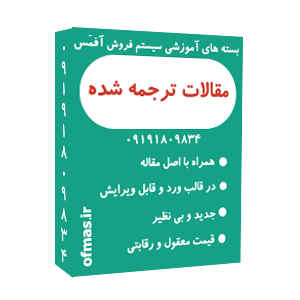ترجمه مقاله فلسفه اطلاعات به عنوان یک نظریه اساسی و متحد کننده ی علم اطلاعات در 18 صفحه فارسی ورد قابل ویرایش را فرمت doc به همراه اصل مقاله انگلیسی
عنوان فارسی :
فلسفه اطلاعات به عنوان یک نظریه اساسی و متحد کننده ی علم اطلاعات
عنوان انگلیسی :
The philosophy of information as an underlying and unifying theory of information science
تعداد صفحات فارسی : 18 صفحه ورد قابل ویرایش
سطح ترجمه : متوسط
شناسه کالا : y2130
دانلود رایگان مقاله انگلیسی : http://ofmas.ir/dlpaper/y2130.pdf
دانلود ترجمه فارسی مقاله : بلافاصله پس از پرداخت آنلاین 23 هزار تومان قادر به دانلود خواهید بود .
بخشی از ترجمه :
چکیده مقدمه. تحلیلهای فلسفی اصول نظری زیر بنای این حوزه های فرعی، فلسفه ی اطلاعات را به عنوان متا تئوری اساسی علم اطلاعات آشکار میکند.
روش. تحقیقات مفهومی پیرامون حوزه های فرعی دانش در علم و فلسفه و آنالیز اطلاعات از ارتباط دو جانبه ی آنها.
تحلیل. شباهات بین هسته های مفهومی و سوالات تحقیقاتی دو حوزه مورد بررسی قرار گرفته است. روشهای نتیجه بخش و حوزه های دانش فلسفه ی اطلاعات مورد مطالعه قرار گرفته اند.
نتایج. فلسفه ی اطلاعات به عنوان یک نظریه زیربنایی و اساسی، مسائل فلسفی را در کل حوزه های فرعی اطلاعات، مورد مطالعه قرار داده است. در بازیابی اطلاعات، هستی شناسی و معرفت شناسی را مورد مطالعه قرار میدهد. سازمان دهی دانش، فلسفه ی زبان را بکار میبرد.نظریه های مدیریت اطلاعات، مسائل هستی شناسی کلاسیک را در بستر دانش سازمانی، عملی میسازد. مطالعات رفتار اطلاعات از نظریه ی استدلال بهره میبرد. تحلیلهای فلسفی ممکن است احتمالا بررسی کند چطور قوانین عینی مدلهای کتاب سنجی بر مفاهیم و ارزیابی های دانش اثر میگذارد. حوزه ی فرعی سواد اطلاعات، به طور معناداری با مفاهیم فسلفی و تکنیکهای تفکر انتقادی سازگار است.
نتیجه گیری. همانطور که نظریه اساسی و متحد کننده ی علم اطلاعات، فلسفه ی اطلاعات، توانایی های پیشرفته ی تفکر انتقادی در حوزه های فرعی را بکار میبرد، با توجه به نقشی که فناوری اطلاعات و ساختارهای دانش حاصل، قوانین، زبانها و نظام ها ممکن است برای رشد ذهن و دنیا داشته باشد.
Abstract
Introduction. Philosophical analyses of theoretical principles underlying these sub-domains reveal philosophy of information as underlying meta-theory of information science. Method. Conceptual research on the knowledge sub-domains in information science and philosophy and analysis of their mutual connection. Analysis. Similarities between conceptual cores and research questions of the two fields have been investigated. The consequent methods and knowledge domains of philosophy of information have been studied. Results. As the underlying theory, philosophy of information discovers philosophical questions in all of the information sub-domains studied. In information retrieval, it studies ontological and epistemological. Knowledge organization implements philosophy of language. Theories of information management actualize classical epistemological issues in the context of organizational knowledge. Studies of information behaviour benefit from argumentation theory. Philosophical analyses may possibly investigate how the concrete rules of bibliometric models influence conceptions and evaluations of knowledge. The sub-domain of information literacy is significantly compatible with philosophical conceptions and techniques of critical thinking. Conclusions. As underlying and unifying theory of information science, philosophy of information implements advanced abilities of critical thinking in the sub-domains, with respect to the role that information technology and the resulting knowledge structures, codes, languages and systems might have for the development of mind and world.

 دسته :
دسته :